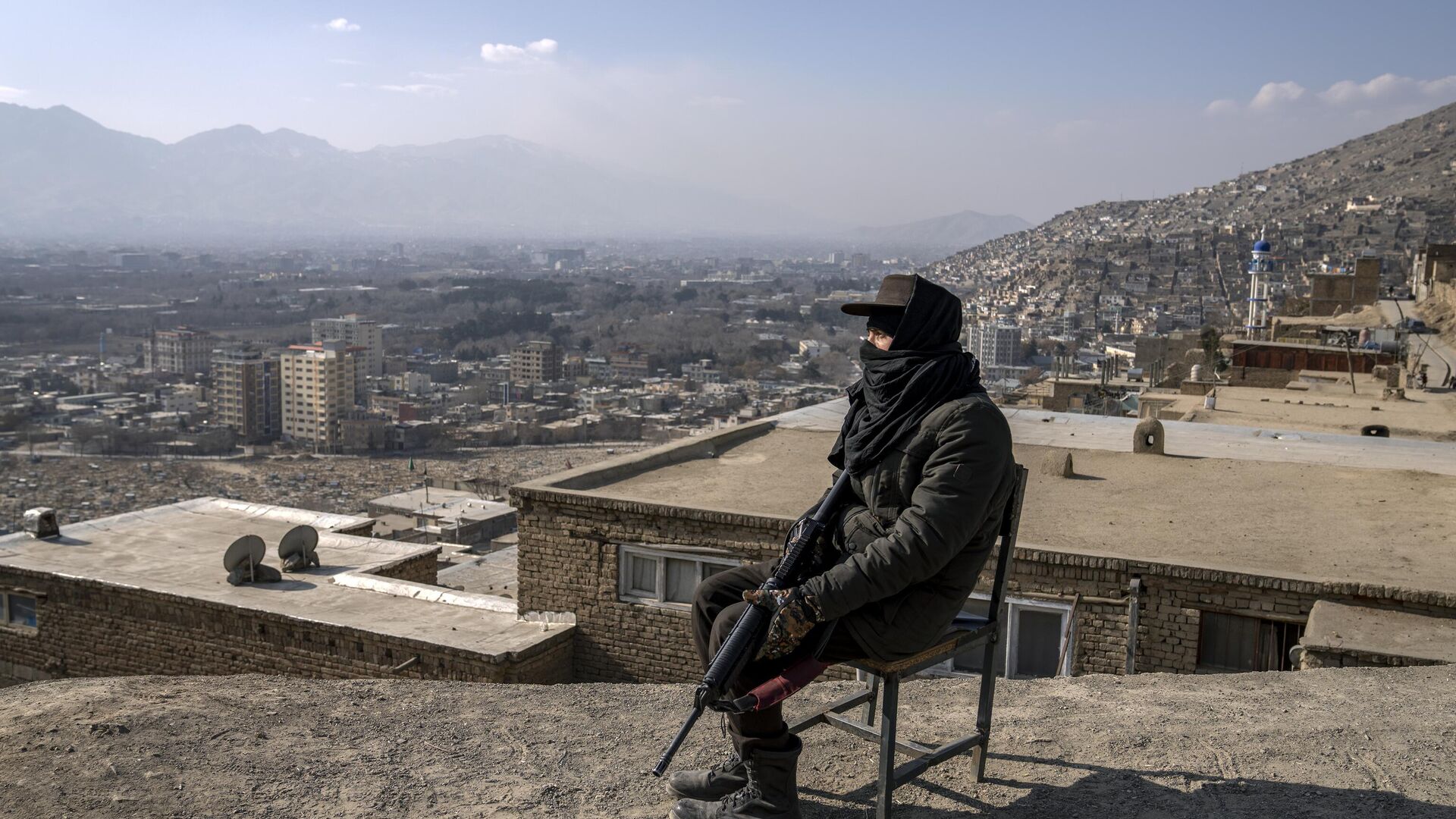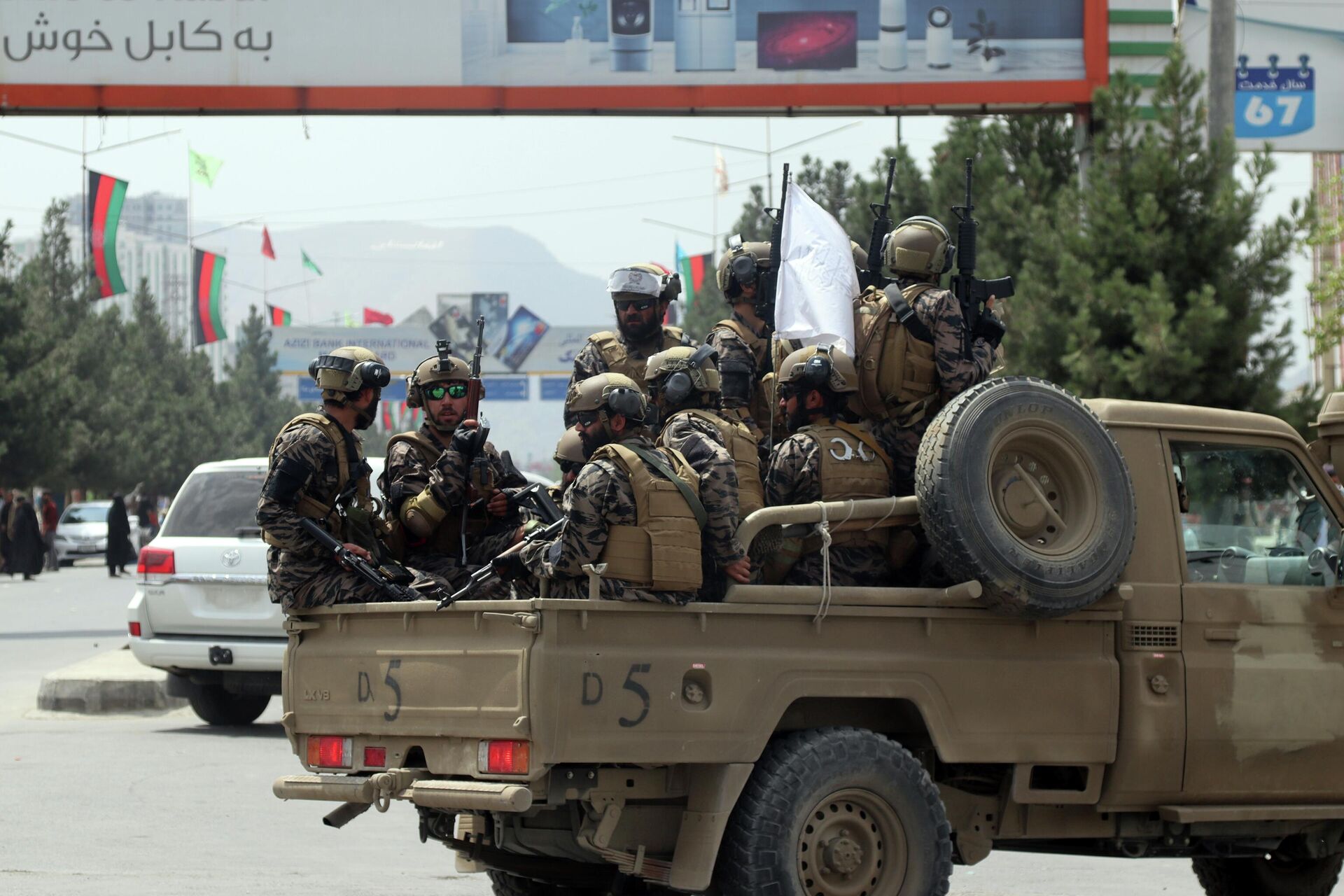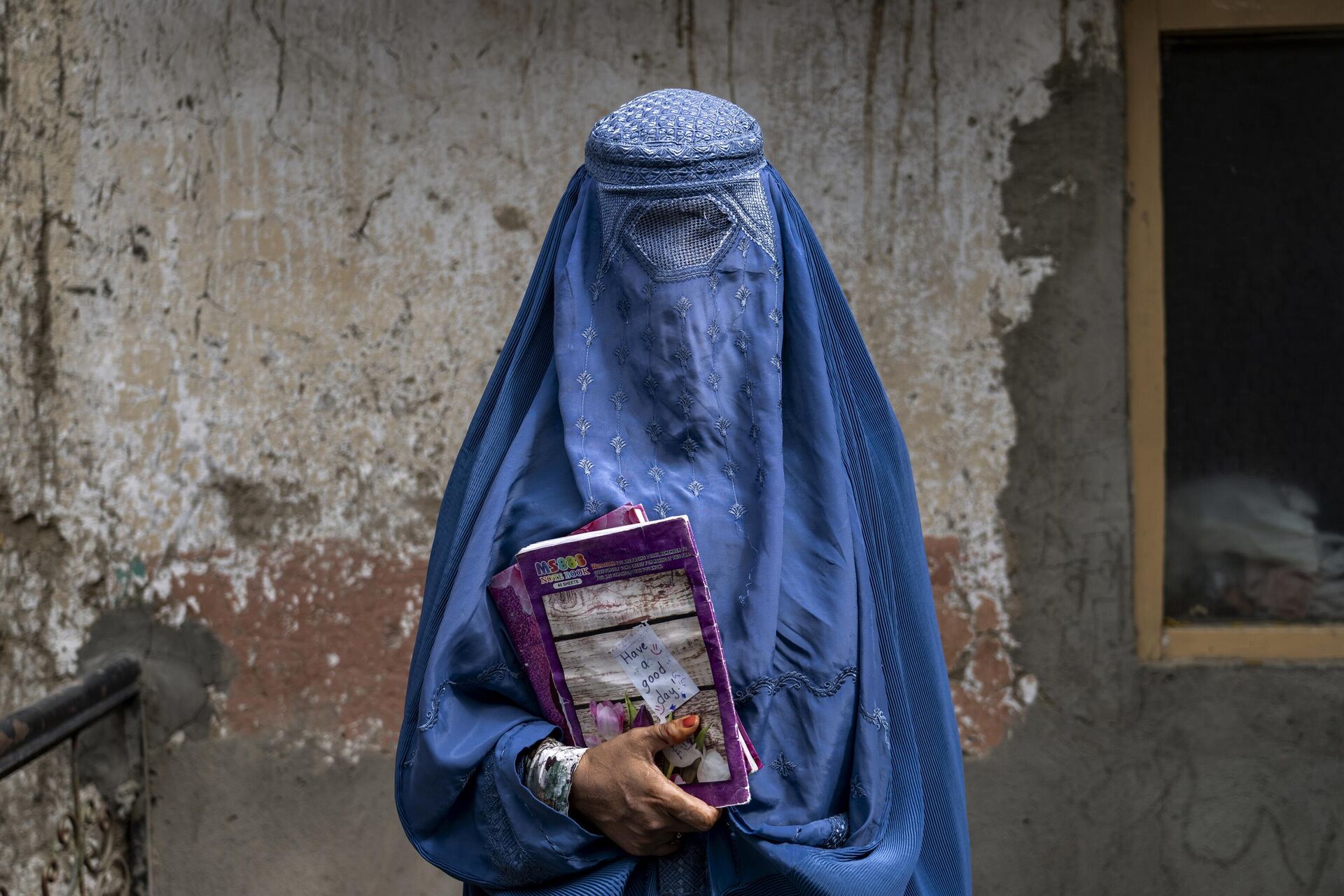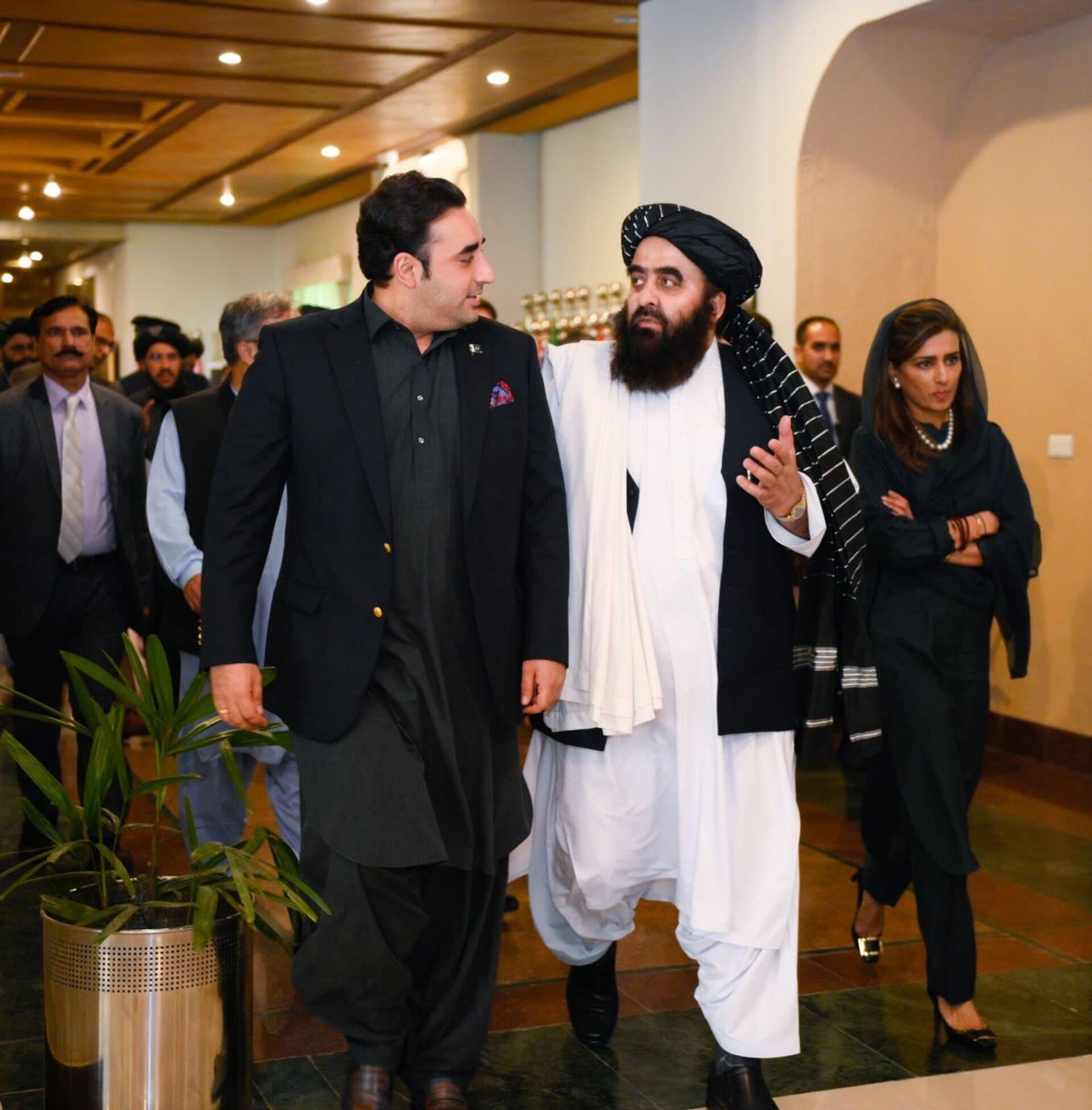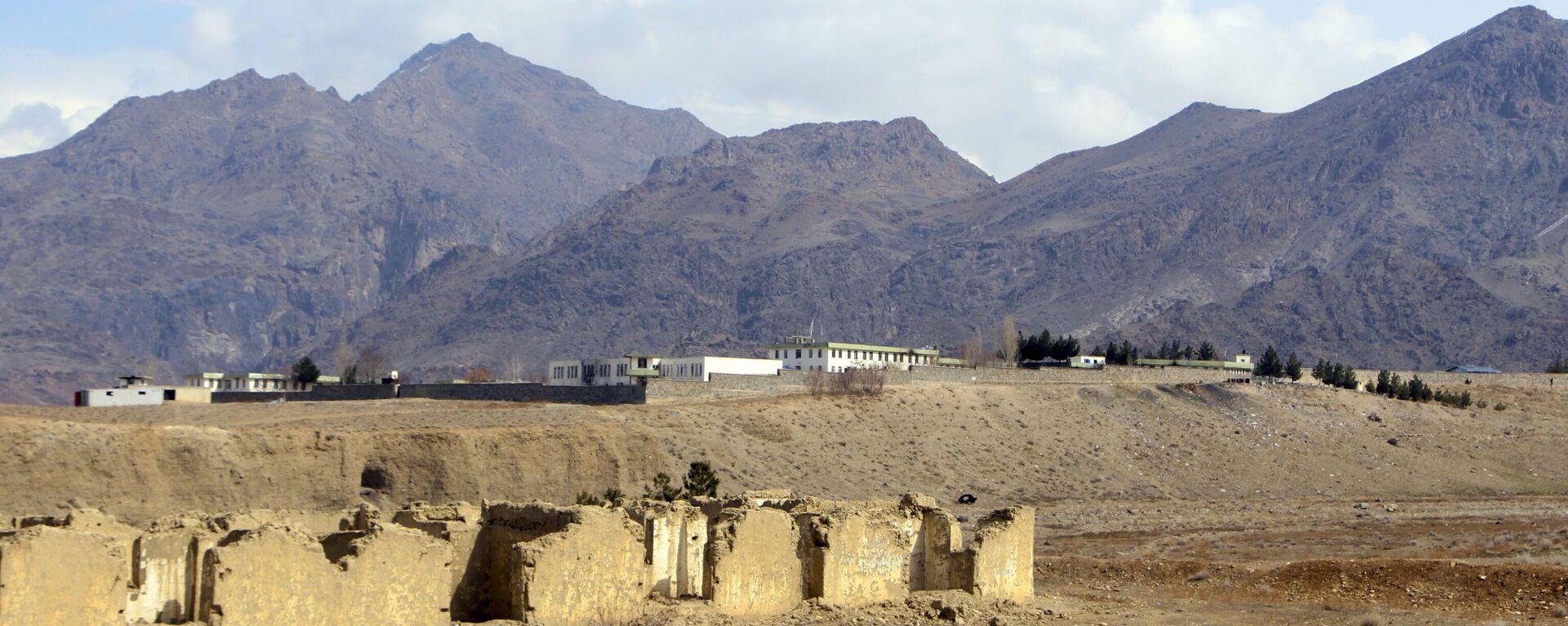https://sputniknews.in/20231205/unraveling-the-impact-of-india-pakistan-rivalry-on-afghanistans-future-5705895.html
Unraveling the Impact of India-Pakistan Rivalry on Afghanistan's Future
Unraveling the Impact of India-Pakistan Rivalry on Afghanistan's Future
Sputnik India
Pakistan and India, two neighbors with a complex and long history, are now navigating a new chapter in their relationship, with Afghanistan at the center of their evolving dynamic.
2023-12-05T13:27+0530
2023-12-05T13:27+0530
2023-12-05T13:43+0530
pakistan
afghanistan
india
taliban
nato
tehreek-e-taliban pakistan (ttp)
s. jaishankar
proxy war
south asia
political controversy
https://cdn1.img.sputniknews.in/img/07e7/01/18/623027_0:160:3073:1888_1920x0_80_0_0_03749a42a45ca96e80dace223d5cff95.jpg
The simmering pot of Afghanistan has long been the stage for a complex geopolitical and strategic drama, with Pakistan and India playing the starring roles. Amidst the uncertainty and chaos which have engulfed the Afghanistan, these two neighboring rivals have been maneuvering their pawns for power and influence, their actions adding a fiery twist to the region's political masala.This long-running animosity entered a new chapter in 2021 with the Taliban's* takeover of Afghanistan, adding complexity to the region's already complex dynamics. Pakistan and India are trying to find a point of agreement between supporting the new regime's policies and pursuing their own interests as the Taliban-led government tightens its grip on power.However, the country (Afghanistan) is confronting a severe humanitarian crisis, with millions of Afghans displaced in the form of refugee crisis, the eviction of Afghans from Pakistan, a shut embassy and school and growing engagement with the Taliban point to New Delhi’s changing approach to Kabul, facing food shortages, and the emergence of the Daesh** sub-group of the ISIS-K militant group. Additionally, the economy has collapsed, and the security situation remains precarious. The international community is grappling with how to respond to the crisis, balancing the need to provide humanitarian assistance with the challenges of engaging with the Taliban.The recent advent of Daesh ISIS-K** militants in Afghanistan and the conflict between Taliban and Daesh ISIS-K militants are forecasting new threats for the region. The attacks by Daesh ISIS-K militants in Afghanistan, Pakistan, and on American and Chinese nationals are portraying a gloomy and different picture. Since the fall of Kabul in 2021, Daesh ISIS-K militants have done 400 attacks.Power Struggle Shaping Afghanistan's FutureAs per analysis and media reports, the future of Afghanistan remains uncertain, but Pakistan, and India’s role in the country will undoubtedly shape its trajectory in the years to come.Both states, Pakistan and India continue to assert their influence in Taliban-led government and Afghanistan, leading to a perpetual struggle over the country's future. As each country advocates for their own geo political and strategic interests, their strained relationship since gaining independence has further fueled conflicts within Afghanistan, amplifying regional instability.As the situation in Afghanistan remains uncertain, both India and Pakistan continue to face challenges in balancing their support for the Taliban government while protecting their interests and ensuring the peace and stability of the region. India has tried to provide humanitarian aid and establish diplomatic relations with the Taliban government, while Pakistan has navigated its relationship with the Taliban while preventing the spillover of violence across its borders.However, the deportation of Afghan refugees from Pakistan and Pakistan's warning to the Taliban government about not giving terrorists a safe space in the country have created a rift between Pak-Taliban government relationships. Moreover, as per Indian media reports, India has reservations that the surge of terrorism in the region is sponsored by Pakistan's terrorist groups, such as the Tehreek-i-Taliban (TTP)*** and Lashkar-e-Taiba**** militant groups, which have been supported by Pakistan, and that the fall of Kabul is all due to the interference of Pakistan's state. Whereas Pakistani media reported that terrorist attacks on Pakistani regions by the TTP and other militant groups are sponsored and backed by an Indian intelligence network.Moreover, he responded “However, Pakistan has grievances against the Taliban-based government, and the Taliban's lack of action against TTP exacerbates these tensions as their activities target Pakistan. This web of socio-political and strategic factors thus collectively shapes Afghanistan's uncertain future.”Post-Kabul DynamicsSince the fall of Kabul, there has been a disturbance in Indo-Afghan relationship, with the Afghan embassy claiming that all diplomats affiliated with the former government have safely reached third countries, while the only individuals present in India are those affiliated with the Taliban movement.The NATO and US withdrawal from Afghanistan has created a power vacuum that Pakistan and India are vying to fill, with India adopting a cautious approach due to security concerns and Pakistan seeking to maintain its historical ties with the Taliban. The evolving geopolitical landscape necessitates strategic recalibrations from two states.It is, nevertheless, essential that both countries prioritize peace and stability in Afghanistan rather than engaging in a hybrid warfare, which could have devastating consequences for the country and the wider region. But it remains unclear what the long-term relationship between the two countries and the Taliban government will be.Jaspal, a Pakistan-based political analyst, nevertheless shared with Sputnik, that historically “Afghan officials have a warm spot for Indians, following the "enemy of my enemy is my friend" doctrine, because of the issue that is the Durand Line disagreement between Pakistan and Afghanistan.”However, when Sputnik asked the president of the International Research Council for Religious Affairs and a political analyst about the Pak-Afghan relationship and its rift, Muhammad Israr Madani said, “I think Pakistan and Afghanistan not only have socio-cultural ties but also have economic opportunities as neighboring countries. Both states rely on each other. When one faces any sort of socio-political challenge, other countries variably confront it at the same time. Despite the fact that both countries have interconnected interests and terms, they are still raising eyebrows at each other.”Economic Challenges: Roadmap for RecoveryAfghanistan's economic landscape remains precarious, with the country experiencing a contraction of 25% over the past two years. This economic downturn has had a devastating impact on the lives of millions of Afghans, with poverty, food insecurity, and unemployment reaching alarming levels. Understanding the complex factors contributing to Afghanistan's economic woes is crucial for developing effective strategies to foster recovery and improve the lives of its citizens.The contraction of Afghanistan's economy by a staggering 25% over the last two years underscores the fragility of its financial foundations. This economic downturn can be attributed to various factors, including the withdrawal of international aid, disruptions to trade and commerce, and the impact of the COVID-19 pandemic. Moreover, Taliban policies, particularly those hindering women's education and work, have further compounded the economic challenges faced by Afghanistan.Access to education is a cornerstone of economic development and poverty reduction. However, in Afghanistan, access to secondary education is limited, particularly for girls. This lack of educational opportunities for women poses a significant barrier to economic recovery and social progress. Additionally, unemployment has doubled in Afghanistan due to extra labor mobilization, further exacerbating the economic hardship faced by many families.Afghanistan's revenue from the Islamic Tax Authority (ITA) reached $2.2 billion in FY 2022, with exports hitting $1.9 billion in the same year. However, a subsequent slowdown in exports in 2023, coupled with deflation since April 2023, poses challenges. The appreciating Afghani impacts domestic manufacturing negatively, exacerbating the predicament. The constricted financial system, reliance on informal trade channels, and declining off-budget international aid for humanitarian services compound the economic woes.Afghanistan's economic landscape remains precarious, but the path towards recovery is not insurmountable. Addressing the economic challenges faced by the country requires a multifaceted approach that includes addressing Taliban policies hindering women's education and work, providing support for small businesses and entrepreneurs, and promoting agricultural productivity. Additionally, international cooperation and support will play a crucial role in facilitating economic recovery and improving the lives of millions of Afghans, according to media.India & Pakistan's Changing Role in AfghanistanIn the context of the Pak-Afghan chessboard, Zafar Nawaz Jaspal, a geopolitical analyst, shared with Sputnik News: "Pakistan, however, has invested so much in Afghanistan and its stability but still has failed to build cordial relations with the current Taliban regime, and the advantage goes to India.”Since 1947, Pakistan and India have been fighting with each other over disputed territories. Both are among the major stakeholders in the region. Pakistan’s claim is that it is an immediate neighbor of Afghanistan, and instability in Afghanistan has spillover effects in Pakistan. However, it is a well-known fact that Pakistan’s security concerns cannot be addressed without having peace and stability in Afghanistan, or at least by recognizing each other’s security concerns.Indian policy toward Afghanistan is derived through Pakistan’s lenses to counter Pakistan’s concept of strategic depth while maintaining cordial relations with Afghanistan. In this respect, historically, Pakistan and India have been engaged to establish their favorable governments in Afghanistan that could promote the interests of one while countering the other. That’s why Pakistan and India's hybrid warfare in Afghanistan is marked as the “Zero-Sum Game." One of the most important factors pulling towards a proxy war is the Kashmir conflict. To have peace and stability in Afghanistan, a regional approach is considered more viable. It seems that after the withdrawal of NATO forces from Afghanistan, India-Pakistan rivalry will intensify, which could have adverse effects on the efforts being made for peace and stability in Afghanistan. So, it is the responsibility of the international community to play its role in settling the concerns of regional members, particularly Pakistan and India; otherwise, peace and stability in Afghanistan would remain a dream, or even worse, a nightmare. This is qualitative research based on secondary sources. A descriptive and analytic approach has been adopted to accomplish it in a comprehensive way.Both countries Pakistan and India owing to their rivalry have been using Afghan soil as a buffer state and safe place for proxy war against each other, as per independent news analysts.When asked who is to blame for the current state of affairs in Afghanistan, “Jaspal responded that his answer is twofold: first, the Afghan people, and second, the power politics of regional and international actors.”Qamar Cheema, a strategic, research, and political analyst, told Sputnik further, “Both countries India and Pakistan, learned a lesson after the fall of Kabul that peace, coexistence, and dialogue are more important than being involved in hybrid warfare against each other. And more importantly, today or tomorrow, I think both countries, Pakistan and India, will set the same table and have a dialogue on the Afghan conundrum and its future for the betterment of regional prosperity.”Last but not least, as per media reports from both countries, India and Pakistan are cautiously exploring ways to engage with the new regime, balancing their interests with their concerns. And it is a fact of matter that the future of Afghanistan depends upon the good relations between Pakistan and India, which will determine the stability, peace, and harmony in the region in general and Afghanistan in particular. For this purpose, both countries, along with regional organizations like SCO, ECO, and BRICS, should set together to think about the roadmap of the Afghan conundrum; otherwise, the sword of Daesh ISIS-K is hanging over south and central Asia as a new threat.*The Taliban is under UN sanctions for extremism.**ISIS-K, Daesh (IS/ISIS/ISIL) is a terrorist organization banned in Russia and other states.***Tehreek-i-Taliban Pakistan (TTP) - a terrorist organization banned in Russia and India.****Lashkar-e-Taiba - a proscribed terrorist organisation.
https://sputniknews.in/20231129/india-may-consider-making-strategic-move-on-afghanistan-experts-5624299.html
pakistan
afghanistan
india
south asia
Sputnik India
feedback.hindi@sputniknews.com
+74956456601
MIA „Rossiya Segodnya“
2023
Muhammad Sharif
https://cdn1.img.sputniknews.in/img/07e7/0b/05/5257054_0:0:443:444_100x100_80_0_0_b8bd2af32be62a6eecdb4a84c7fd978f.jpg
Muhammad Sharif
https://cdn1.img.sputniknews.in/img/07e7/0b/05/5257054_0:0:443:444_100x100_80_0_0_b8bd2af32be62a6eecdb4a84c7fd978f.jpg
News
en_IN
Sputnik India
feedback.hindi@sputniknews.com
+74956456601
MIA „Rossiya Segodnya“
Sputnik India
feedback.hindi@sputniknews.com
+74956456601
MIA „Rossiya Segodnya“
Muhammad Sharif
https://cdn1.img.sputniknews.in/img/07e7/0b/05/5257054_0:0:443:444_100x100_80_0_0_b8bd2af32be62a6eecdb4a84c7fd978f.jpg
india-pakistan rivalry, afghanistan future, proxy wars, pakistan and india relations, political masala, taliban-led government, taliban, militants in afghanistan, political and strategic interests, pak-taliban government relationships, indo-afghan relationship, taliban movement, taliban regime, economic recovery, women education in afghanistan, educational opportunities for women, immediate neighbors of afghanistan, kashmir conflict, afghan people, pakistan and india ties, hybrid warfare
india-pakistan rivalry, afghanistan future, proxy wars, pakistan and india relations, political masala, taliban-led government, taliban, militants in afghanistan, political and strategic interests, pak-taliban government relationships, indo-afghan relationship, taliban movement, taliban regime, economic recovery, women education in afghanistan, educational opportunities for women, immediate neighbors of afghanistan, kashmir conflict, afghan people, pakistan and india ties, hybrid warfare
The simmering pot of
Afghanistan has long been the stage for a
complex geopolitical and strategic drama, with
Pakistan and India playing the starring roles.
Amidst the uncertainty and chaos which have engulfed the Afghanistan, these two neighboring rivals have been maneuvering their pawns for power and influence, their actions adding a fiery twist to the region's
political masala.
This long-running animosity entered a new chapter in 2021 with the
Taliban's* takeover of Afghanistan, adding complexity to the region's already complex dynamics. Pakistan and India are trying to find a point of agreement between supporting the new regime's policies and pursuing their own interests as the
Taliban-led government tightens its grip on power.
However, the country (Afghanistan) is confronting a severe
humanitarian crisis, with millions of Afghans displaced in the form of refugee crisis, the eviction of Afghans from Pakistan, a shut embassy and school and growing engagement with the Taliban point to
New Delhi’s changing approach to
Kabul, facing food shortages, and the emergence of the Daesh** sub-group of the ISIS-K militant group. Additionally, the economy has collapsed, and the security situation remains precarious. The international community is grappling with how to respond to the crisis, balancing the need to provide humanitarian assistance with the challenges of engaging with the Taliban.
The recent advent of Daesh ISIS-K** militants in Afghanistan and the conflict between Taliban and Daesh ISIS-K militants are forecasting new threats for the region. The attacks by Daesh ISIS-K militants in Afghanistan, Pakistan, and on American and
Chinese nationals are portraying a gloomy and different picture. Since the fall of Kabul in 2021, Daesh ISIS-K militants have done 400 attacks.
Power Struggle Shaping Afghanistan's Future
As per analysis and media reports, the future of Afghanistan remains uncertain, but Pakistan, and India’s role in the country will undoubtedly shape its trajectory in the years to come.
Both states, Pakistan and India continue to assert their influence in Taliban-led government and Afghanistan, leading to a perpetual struggle over the country's future. As each country advocates for their own geo political and
strategic interests, their strained relationship since gaining independence has further fueled conflicts within Afghanistan, amplifying regional instability.
Zafar Nawaz Jaspal, Director, International Relations and Political Department, Professor, Geopolitical Analyst, told Sputnik that “The situation between Pakistan and India in the context of Afghanistan is much contested. Historical speaking, Afghanis have refused to acknowledge the Durand line, assert Afghan sovereignty over Pakistani land, and the Pashtun movement have all contributed to the country's troubled history of strained relations with neighboring Pakistan.”
As the situation in Afghanistan remains uncertain, both India and Pakistan continue to face challenges in balancing their support for the Taliban government while protecting their interests and ensuring the peace and stability of the region. India has tried to provide
humanitarian aid and establish diplomatic relations with the Taliban government, while Pakistan has navigated its relationship with the Taliban while preventing the spillover of violence across its borders.
However, the deportation of
Afghan refugees from Pakistan and Pakistan's warning to the Taliban government about not giving terrorists a safe space in the country have created a rift between Pak-Taliban government relationships. Moreover, as per Indian media reports, India has reservations that the surge of terrorism in the region is sponsored by Pakistan's terrorist groups, such as the Tehreek-i-Taliban (TTP)*** and Lashkar-e-Taiba**** militant groups, which have been supported by Pakistan, and that the fall of Kabul is all due to the interference of Pakistan's state. Whereas Pakistani media reported that terrorist attacks on Pakistani regions by the TTP and other militant groups are sponsored and backed by an Indian intelligence network.
In this regard, Salman Javed, Director General of the Pak-Afghan Youth Forum and political analyst, told Sputnik, “Both countries, Pakistan and India, are here on the same point that the presence of terrorist safe havens on Afghan soil strains relations with both states, India and Pakistan.”
Moreover, he responded “
However, Pakistan has grievances against the Taliban-based government, and the Taliban's lack of action against TTP exacerbates these tensions as their activities target Pakistan. This web of socio-political and strategic factors thus collectively shapes Afghanistan's uncertain future.”Qamar Cheema, a Pakistan-based strategic and political analyst, said, “Pakistan has ups and downs in its relationship with Afghanistan due to some reservations, like the Tehreek and Taliban, and other militant groups’ attacks on Pakistan by using Afghan soil as a sanctuary.”
Since the fall of Kabul, there has been a disturbance in
Indo-Afghan relationship, with the Afghan embassy claiming that all diplomats affiliated with the former government have safely reached third countries, while the only individuals present in India are those affiliated with the Taliban movement.
The
NATO and
US withdrawal from Afghanistan has created a power vacuum that Pakistan and India are vying to fill, with India adopting a cautious approach due to
security concerns and Pakistan seeking to maintain its historical ties with the Taliban. The evolving geopolitical landscape necessitates strategic recalibrations from two states.
Nonetheless, when Sputnik asked Qamar Cheema, a Pakistan-based strategic and political analyst, about this, he said, “The strategic location of Afghanistan, nestled between India and Pakistan, has historically made it a focal point of regional competition. The Taliban's return to power has further complicated the dynamics, with both India and Pakistan seeking to exert their influence on the Afghan government."
It is, nevertheless, essential that both countries prioritize peace and stability in Afghanistan rather than engaging in a
hybrid warfare, which could have devastating consequences for the country and the wider region. But it remains unclear what the long-term relationship between the two countries and the Taliban government will be.
Jaspal, a Pakistan-based political analyst, nevertheless shared with Sputnik, that historically “Afghan officials have a warm spot for Indians, following the "enemy of my enemy is my friend" doctrine, because of the issue that is the Durand Line disagreement between Pakistan and Afghanistan.”
Salman Javed, an analyst in this context, told Sputnik News, “India's growing influence in Afghanistan is causing concern in Pakistan, which seeks a friendly government in Kabul. India's influence, while significant, faces long-term challenges under the new Taliban regime.”
However, when Sputnik asked the president of the International Research Council for Religious Affairs and a political analyst about the Pak-Afghan relationship and its rift,
Muhammad Israr Madani said, “
I think Pakistan and Afghanistan not only have socio-cultural ties but also have economic opportunities as neighboring countries. Both states rely on each other. When one faces any sort of socio-political challenge, other countries variably confront it at the same time. Despite the fact that both countries have interconnected interests and terms, they are still raising eyebrows at each other.”Economic Challenges: Roadmap for Recovery
Afghanistan's economic landscape remains precarious, with the country experiencing a contraction of 25% over the past two years. This economic downturn has had a devastating impact on the lives of millions of Afghans, with poverty, food insecurity, and unemployment reaching alarming levels. Understanding the complex factors contributing to Afghanistan's economic woes is crucial for developing effective strategies to foster recovery and improve the lives of its citizens.
Salman Javed, a political analyst, additionally told Sputnik, “Afghanistan's economy is fragile, with a 25% contraction over the past two years and one in two Afghans in poverty. Taliban policies hinder economic recovery. Inflation and limited access to education exacerbate the challenges faced by the Afghan economy.”
The contraction of Afghanistan's economy by a staggering 25% over the last two years underscores the fragility of its financial foundations. This economic downturn can be attributed to various factors, including the withdrawal of international aid, disruptions to trade and commerce, and the impact of the
COVID-19 pandemic. Moreover, Taliban policies, particularly those hindering women's education and work, have further compounded the economic challenges faced by Afghanistan.
Javed, a political analyst, told Sputnik News, “Political insecurity poses a significant challenge to Afghanistan's stability, with internal divisions within the Taliban and discontent among other political groups. Humanitarian crises, including post-conflict recovery, harsh winters, migration, and displacement, further compound the nation's woes. Afghanistan's neighborhood policy aims to diversify relations and minimize reliance on Pakistan, despite ongoing challenges such as water disputes and refugee mistreatment concerns.”
Access to education is a cornerstone of economic development and poverty reduction. However, in Afghanistan, access to secondary education is limited, particularly for girls. This lack of
educational opportunities for women poses a significant barrier to economic recovery and social progress. Additionally, unemployment has doubled in Afghanistan due to extra labor mobilization, further exacerbating the economic hardship faced by many families.
The inflationary spiral, peaking at 18.3% in July 2022 before transitioning into deflation by April 2023, has far-reaching consequences for the Afghan population. Foodstuff inflation at 26% in June 2022 plunges 20 million people into 'high or critical levels of acute food insecurity.' This food insecurity is further exacerbated by supply disruptions and shocks in commodity prices, highlighting the challenges confronting the Afghan economy.
Afghanistan's revenue from the Islamic Tax Authority (ITA) reached $2.2 billion in FY 2022, with exports hitting $1.9 billion in the same year. However, a subsequent slowdown in exports in 2023, coupled with deflation since April 2023, poses challenges. The appreciating Afghani impacts domestic manufacturing negatively, exacerbating the predicament. The constricted financial system, reliance on informal trade channels, and declining off-budget international aid for humanitarian services compound the economic woes.
Afghanistan's economic landscape remains precarious, but the path towards recovery is not insurmountable. Addressing the economic challenges faced by the country requires a multifaceted approach that includes addressing Taliban policies hindering
women's education and work, providing support for small businesses and entrepreneurs, and promoting agricultural productivity. Additionally, international cooperation and support will play a crucial role in facilitating economic recovery and improving the lives of millions of Afghans, according to media.
India & Pakistan's Changing Role in Afghanistan
In the context of the Pak-Afghan chessboard, Zafar Nawaz Jaspal, a geopolitical analyst, shared with Sputnik News: "Pakistan, however, has invested so much in Afghanistan and its stability but still has failed to build cordial relations with the current Taliban regime, and the advantage goes to India.”
Since 1947, Pakistan and India have been fighting with each other over disputed territories. Both are among the major stakeholders in the region. Pakistan’s claim is that it is an immediate neighbor of Afghanistan, and instability in Afghanistan has spillover effects in Pakistan. However, it is a well-known fact that Pakistan’s security concerns cannot be addressed without having peace and stability in Afghanistan, or at least by recognizing each other’s security concerns.
Indian policy toward Afghanistan is derived through Pakistan’s lenses to counter Pakistan’s concept of strategic depth while maintaining cordial relations with Afghanistan. In this respect, historically, Pakistan and India have been engaged to establish their favorable governments in Afghanistan that could promote the interests of one while countering the other. That’s why Pakistan and India's hybrid warfare in Afghanistan is marked as the “Zero-Sum Game." One of the most important factors pulling towards a proxy war is the Kashmir conflict. To have peace and stability in Afghanistan, a regional approach is considered more viable. It seems that after the withdrawal of NATO forces from Afghanistan, India-Pakistan rivalry will intensify, which could have adverse effects on the efforts being made for
peace and stability in Afghanistan. So, it is the responsibility of the international community to play its role in settling the concerns of regional members, particularly Pakistan and India; otherwise, peace and stability in Afghanistan would remain a dream, or even worse, a nightmare. This is qualitative research based on secondary sources. A descriptive and analytic approach has been adopted to accomplish it in a comprehensive way.
Both countries Pakistan and India owing to their rivalry have been using Afghan soil as a buffer state and safe place for proxy war against each other, as per independent news analysts.
When asked who is to blame for the current state of affairs in Afghanistan, “Jaspal responded that his answer is twofold: first, the Afghan people, and second, the power politics of regional and international actors.”
However, when Sputnik asked Salman Javed, a Pakistan-based political analyst, about the future of Afghanistan from the perspective of the Indo-Pak conflict, he said, “The future of Afghanistan remains uncertain, and the involvement of India and Pakistan will undoubtedly shape the country's trajectory in the years to come. It is essential that both countries work together to support Afghanistan and prioritize peace and stability in the region to prevent further exacerbations of conflicts and instability.”
Qamar Cheema, a strategic, research, and political analyst, told Sputnik further,
“Both countries India and Pakistan, learned a lesson after the fall of Kabul that peace, coexistence, and dialogue are more important than being involved in hybrid warfare against each other. And more importantly, today or tomorrow, I think both countries, Pakistan and India, will set the same table and have a dialogue on the Afghan conundrum and its future for the betterment of regional prosperity.” Last but not least, as per media reports from both countries, India and Pakistan are cautiously exploring ways to engage with the new regime, balancing their interests with their concerns. And it is a fact of matter that the future of Afghanistan depends upon the good relations between Pakistan and India, which will determine the stability, peace, and harmony in the region in general and Afghanistan in particular. For this purpose, both countries, along with regional organizations like
SCO, ECO, and
BRICS, should set together to think about the roadmap of the Afghan conundrum; otherwise, the sword of Daesh ISIS-K is hanging over south and central Asia as a new threat.
*The Taliban is under UN sanctions for extremism. **ISIS-K, Daesh (IS/ISIS/ISIL) is a terrorist organization banned in Russia and other states.***Tehreek-i-Taliban Pakistan (TTP) - a terrorist organization banned in Russia and India.****Lashkar-e-Taiba - a proscribed terrorist organisation. 